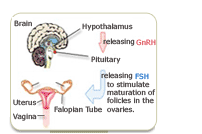34 MENOPAUSE SYMPTOMS |
HEALTH CENTER |
|
| |
|
|
|
| |
|
|
As women prioritize their education and careers and wait longer before marriage and children, infertility issues are becoming increasingly common. Although doctors are often unsure of exactly what may cause infertility in any given couple, the fact is that after thirty years of age women have increasing difficulty getting pregnant as their hormone levels decline and ovarian function diminishes. Keep reading to learn more about infertility.
|
|
Infertility is defined as the inability to get pregnant (or carry a pregnancy to term) after a full year of regular, unprotected sexual intercourse. Ten to fifteen percent of American couples suffer from infertility.
Normally, most women will get pregnant within six months of trying. Around 85% of women get pregnant after one year of unprotected sex, while half of the remaining women will get pregnant in the following three years. |
|
: Primary infertility is when a woman has never become pregnant.
Secondary infertility is when a woman has previously been pregnant (whether or not she gave birth).
|
|
A woman who finds herself unable to get pregnant after a full year of trying most likely has a problem, and should seek advice from her doctor. Women over the age of 32 who have difficulty conceiving should seek help from a doctor after six months. The doctor will try to identify the source of the infertility. Infertility can have a myriad of causes, originating from either the female or male partner, or both. |
|
|
|
|
Women faced with infertility are often frustrated with the lack of information about the causes and solutions to their problem. Keep reading to learn more about the common causes of infertility.  |
|
Some causes of infertility are irreversible, but women can improve their chances for conception by making lifestyle changes and taking other steps to balance their hormonal levels. Keep reading to learn more about different treatment options for improving fertility. |
|
|
|
|
|
Improving fertility with MacaActive Supplements |
|
Hormones play an essential role in both a woman's ability to become pregnant and to carry a pregnancy to term. After age 30, hormonal production in women begins to decline, thus decreasing fertility. As women begin to notice the symptoms of hormone deficiency, they may want to consider taking steps to stabilize their hormonal production.
Today, there are three effective ways to normalize hormonal levels: lifestyle changes, alternative medicine and drugs & surgery.
|
|
 |
Lifestyle Changes: This first level of treatment involves no risk, but may be the hardest way to go because you'll have to restrict yourself from many things. That's why most people consider the next level of treatment, alternative medicine, which has proven to be excellent for treating menopausal symptoms in a safe and natural way.
|
|
 |
Alternative medicine: There are two types of herbal supplements for balancing hormone levels and decreasing the risk for infertility: those containing phytoestrogenic herbs, and those containing non-estrogenic herbs. Phytoestrogenic herbs (like Black Cohosh) are filled with phytoestrogens, which are similar to estrogens. They can increase low estrogen levels by replacing some of the missing estrogen hormones. This isn't the best solution, however, because your body will become less responsive to producing estrogen on its own, causing a further decrease in body-own hormone levels. Unlike phytoestrogenic herbs, non-estrogenic herbs don't contain estrogen, but they nourish the hormonal glands to work more efficiently. This ultimately results in balancing not only estrogen, but other necessary hormones, as well. Using non-estrogenic herbs is one of the safest and best ways to treat menopause symptoms naturally.
An excellent example of a safe and effective non-estrogenic herb for hormonal imbalance is herbal MacaActive. What makes MacaActive so special is its ability to balance hormonal levels in women by nourishing the hormonal glands. In this way, balances hormonal levels and improves fertility.  to read more about MacaActive. to read more about MacaActive.
|
|
 |
Drugs and Surgery: This level of treatment has the highest risk and often the highest cost. The most common drug therapy in the US is hormone replacement therapy (HRT). There's no doubt that this is the quickest and strongest way to combat hormonal imbalance. Unfortunately, it entails serious side effects and increases the risk of different types of cancer in women. If you still want to consider this approach, see your doctor to become better informed about what this treatment option involves.
|
|
A safe way for balancing hormones:
Non-estrogenic herbs are the most effective solution for treating hormonal imbalance and improving fertility.
MacaActive is an excellent non-estrogenic herb. It's simple: rather than putting hormones from the outside into your body artificially, MacaActive stimulates your hormone glands into producing the necessary hormones naturally. This is what makes MacaActive supplements so unique.  to read all about MacaActive. |
 |
|
 |
|
|
|






